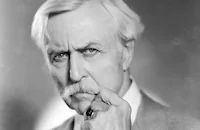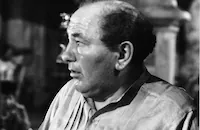Law of the Tropics

Brief Synopsis
Cast & Crew
Ray Enright
Constance Bennett
Jeffrey Lynn
Regis Toomey
Mona Maris
Hobart Bosworth
Film Details
Technical Specs

Synopsis
At the King Rubber Company building in New York City, Alfred King, Jr. tells his father, the company president, that too many old men are running their overseas plantations with outmoded management practices. Meanwhile, at the King plantation in the Amazon, Jim Conway invents a new way to make rubber harden faster. When Jim prepares to meet his American fiancée Laura in a seaport at Los Cedros, his kindly boss, Davis, warns him that the company does not encourage their men to marry because most women cannot bear living in the jungle. At Los Cedros, Jim receives a wire from Laura calling off the wedding and dreads the embarrassment of returning to the plantation without a wife. He gets drunk and meets nightclub entertainer Joan Madison, who, eager to avoid a detective named Maguire, agrees to pose as his wife for $500. At the plantation, Joan and Jim fall silently in love with each other. Then Jim learns that the company has accepted his new process but will be calling it the "King Process," denying him any credit. Soon after, Davis receives word that he is to be replaced and shoots himself. Joan, enraged at the injustice of the workers' unrewarded loyalty, chastises Jim for not asserting himself with the company. Rita, a native who is married to plantation worker Tom Marshall, explains to Joan that the company provides the sole source of income for her people. Joan then confesses to Rita that, although she now loves Jim, initially she was only posing as his wife because she got into trouble in the United States. Later, Joan offers to give Jim back his $500 and tries to tell him her secret, but he professes his love and assures her he does not want to know. The Kings visit the plantation to announce that Junior is going to take over Davis' position, which Jim had wanted. When Jim explains that the men were loyal to Davis and would balk at taking orders from an inexperienced stranger, Junior insults Davis by calling him weak-natured. Jim knocks Junior out and is fired. Joan, however, secretly meets with King, Sr., and by lying that she registered the Conway Process for a patent, gets King to make Jim plantation boss at the salary he was going to pay his son. Maguire arrives and convinces Joan to return to the States and stand trial for murder rather than ruin Jim's good reputation. Joan finally confesses everything to Jim, but tells him she is innocent and was merely protecting someone. Jim assures her their marriage means everything to him, but she pretends to be cold toward him so that he will allow her to leave. The next day when Joan boards the boat with Maguire, however, she finds Jim onboard. He has taken a leave of absence in order to help clear her name.

Director
Ray Enright
Cast

Constance Bennett

Jeffrey Lynn

Regis Toomey

Mona Maris

Hobart Bosworth

Frank Puglia
Thomas Jackson

Paul Harvey

Craig Stevens

Charles Judels
Roland Drew
Cliff Clark
Rolfe Sedan
Luis Alberni
Juan Duval
John Eberts

Martin Garralaga
Creighton Hale
Demetris Emanuel
Paco Moreno
Anna Demetrio
Don Orlando
Mayta Palmera
Crew
George Beatty
Abe Dellar
Bryan Foy
Damon Giffard
Jo Graham
Charles Grayson
Jesse Hibbs
Sid Hickox
Howard Jackson
Robert B. Lee
Charles Novi
George Obligado
Phil Quinn
Frederick Richards
Ben Stoloff
Barry Trivers
Jack L. Warner
M. Coates Webster
Perc Westmore

Film Details
Technical Specs

Articles
Law of the Tropics
A remake of Oil for the Lamps of China (1935), starring Pat O'Brien and Josephine Hutchinson, Law of the Tropics switched settings from Asia to South America. Rubber company man Jim Conway (Jeffrey Lynn) stationed in the Amazon on business gets word that his American fiancée has jilted him. Distraught, while drowning his sorrows he meets Joan Madison (Bennett), a torchy nightclub singer, who, for her own shady reasons, accepts $500 to tell all she's "Mrs. Conway". As the company's machinations grind down on the couple, they find strength in a love they didn't know they had.
Law of the Tropics was made towards the end of the apex of Bennett's career, after she'd made a name for herself first in "confession" pictures like What Price Hollywood? (1932), and then in screwball comedies like Merrily We Live (1938) and Ladies in Love (1936) . Her most iconic role was as Marion, the mischievous ghost paired against an equally spectral Cary Grant in Topper(1937) but the years since that creative triumph were difficult for the woman once considered one of the highest paid actresses in Hollywood. (Her reputation as a skilled money handler was earned after finagling a two-picture deal for $300,000 in the thick of the Great Depression, as well as asking for cuts of distribution gross and a percent of her film's profits. On another occasion, when the film company Gaumont-British slighted her, she successfully sued -- and won -- $65,000 for breach of contract.) Even though her role in Topper had cemented her reputation, she'd accepted it at a steeply discounted salary. Now, in 1941, despite entrepreneurial forays into a cosmetic company and a women's fashion business, she was having financial woes. (However, she dependably lined her pockets with income from all-night poker games, where her cool, unreadable expression helped her rake in money against the likes of David O. Selznick and Samuel Goldwyn.)
1941 was a particularly tumultuous year in Bennett's personal life as well. She married her longtime lover, actor Gilbert Roland (her dalliance had started with him in the early 30s, when she was still married to Henri de la Falaise), and then quickly dropped her new husband for a fling with a nine-years-younger Air Force colonel who dumped his wheelchair-bound wife for Bennett. (Ironically, while she was happy to bed younger lovers, Bennett almost turned down the role of "Joan Madison" because she feared she'd look too old paired against the five-years-younger Jeffrey Lynn.) By year's end she'd also had another baby (with Roland). None of this slowed down her busy wartime support schedule packed with relief charities, benefit performances, and bond drives. But none of that fatigue is evident in Law of the Tropics. Even cast as a two-bit nightclub singer (Bennett had a lovely natural singing voice), she delivers the same sleek, all-knowing charisma that burnished every performance.
by Violet LeVoit
SOURCES:
Kellow, Brian. The Bennetts: An Acting Family. University Press Of Kentucky, 2004.
Carman, Emily Susan. Independent Stardom: Female Stars and Freelance Labor in 1930s Hollywood. ProQuest, 2008.
Trimborn, Harry. "Hollywood Star Walk: Constance Bennett" Los Angeles Times, July 26, 1955.

Law of the Tropics
Quotes
Trivia
Miriam Hopkins turned down the role of Joan Madison.
Notes
The working title of this film was King Rubber. The onscreen credits on the viewed print do not include the title of the source novel or its author. Actor Rolf Sedan's name is misspelled "Rolfe" in the onscreen credits. According to Hollywood Reporter, Alan Hale was originally scheduled to appear in this film. The Variety review states that Miriam Hopkins turned down the role of "Joan" because she felt she was too old to play opposite Jeffrey Lynn. The Daily Variety preview length for the film was 88 minutes, although the Variety review of a projection room screening in New York listed the running time as 76 minutes. George Obligado, the technical advisor on the film, was a representative of the Buenos Aires newspaper La Prensa. In 1935, Warner Bros. released a film based on Alice Tisdale Hobart's novel entitled Oil for the Lamps of China, directed by Mervyn LeRoy and starring Pat O'Brien and Josephine Hutchinson (see AFI Catalog of Feature Films, 1931-40; F3.3210).















